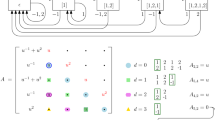Abstract
We investigate the linear orders belonging to the pushdown hierarchy. Our results are based on the characterization of the pushdown hierarchy by graph transformations due to Caucal and do not make any use of higher-order pushdown automata machinery.
Our main results show that ordinals belonging to the n-th level are exactly those strictly smaller than the tower of ω of height n + 1. More generally the Hausdorff rank of scattered linear orders on the n-th level is strictly smaller than the tower of ω of height n. As a corollary the Cantor-Bendixson rank of the tree solutions of safe recursion schemes of order n is smaller than the tower of ω of height n.
As a spin-off result, we show that the ω-words belonging to the second level of the pushdown hierarchy are exactly the morphic words.
Access this chapter
Tax calculation will be finalised at checkout
Purchases are for personal use only
Preview
Unable to display preview. Download preview PDF.
Similar content being viewed by others
References
Bloom, S., Ésik, Z.: Regular and algebraic words and ordinals. In: Mossakowski, T., Montanari, U., Haveraaen, M. (eds.) CALCO 2007. LNCS, vol. 4624, pp. 1–15. Springer, Heidelberg (2007)
Bloom, S., Ésik, Z.: Scattered algebraic linear orderings. In: Proc. of FICS 2009, pp. 25–30 (2009)
Bloom, S., Ésik, Z.: Algebraic ordinals. Fundamenta Informaticae (2010) (to appear)
Blumensath, A.: On the structure of graphs in the Caucal hierarchy. TCS 400(1-3), 19–45 (2008)
Braud, L.: Covering of ordinals. In: Proc. FSTTCS 2009, pp. 97–108 (2009)
Carayol, A.: Regular sets of higher-order pushdown stacks. In: Jedrzejowicz, J., Szepietowski, A. (eds.) MFCS 2005. LNCS, vol. 3618, pp. 168–179. Springer, Heidelberg (2005)
Carayol, A.: Automates infinis, logiques et langages. PhD thesis, Université de Rennes 1 (2006)
Caucal, D.: On infinite transition graphs having a decidable monadic theory. In: Meyer auf der Heide, F., Monien, B. (eds.) ICALP 1996. LNCS, vol. 1099, pp. 194–205. Springer, Heidelberg (1996)
Caucal, D.: On infinite terms having a decidable monadic theory. In: Diks, K., Rytter, W. (eds.) MFCS 2002. LNCS, vol. 2420, pp. 165–176. Springer, Heidelberg (2002)
Courcelle, B.: Frontiers of infinite trees. RAIRO 12, 319–337 (1978)
Courcelle, B.: Monadic second-order definable graph transductions: A survey. TCS 126, 53–75 (1994)
Carayol, A., Wöhrle, S.: The Caucal hierarchy of infinite graphs in terms of logic and higher-order pushdown automata. In: Pandya, P.K., Radhakrishnan, J. (eds.) FSTTCS 2003. LNCS, vol. 2914, pp. 112–123. Springer, Heidelberg (2003)
Ebbinghaus, H.D., Flum, J.: Finite Model Theory. Springer, Heidelberg (1995)
Engelfriet, J.: Iterated stack automata and complexity classes. Inf. Comp. 95(1), 21–75 (1991)
Fratani, S.: Automates à piles de piles.. de piles. PhD thesis, Université Bordeaux 1 (2005)
Hausdorff, F.: Grundzüge einer theorie der geordnete mengen. Math. Ann. 65, 435–505 (1908)
Heilbrunner, S.: An algorithm for the solution of fixed-point equations for infinite words. ITA 14(2), 131–141 (1980)
Kechris, A.: Classical Descriptive Set Theory. Springer, Heidelberg (1994)
Knapik, T., Niwinski, D., Urzyczyn, P.: Higher-order pushdown trees are easy. In: Nielsen, M., Engberg, U. (eds.) FOSSACS 2002. LNCS, vol. 2303, pp. 205–222. Springer, Heidelberg (2002)
Khoussainov, B., Rubin, S., Stephan, F.: Automatic linear orders and trees. ACM Trans. Comput. Log. 6(4), 675–700 (2005)
Maslov, A.N.: Multi-level stack automata. Problems Information Transmission 12, 38–43 (1976)
Ong, L.: Hierarchies of infinite structures generated by pushdown automata and recursion schemes. In: Kučera, L., Kučera, A. (eds.) MFCS 2007. LNCS, vol. 4708, pp. 15–21. Springer, Heidelberg (2007)
Rosenstein, J.: Linear orderings. Academic Press Inc., London (1982)
Thomas, W.: Constructing infinite graphs with a decidable MSO-theory. In: Rovan, B., Vojtáš, P. (eds.) MFCS 2003. LNCS, vol. 2747, pp. 113–124. Springer, Heidelberg (2003)
Author information
Authors and Affiliations
Editor information
Editors and Affiliations
Rights and permissions
Copyright information
© 2010 Springer-Verlag Berlin Heidelberg
About this paper
Cite this paper
Braud, L., Carayol, A. (2010). Linear Orders in the Pushdown Hierarchy. In: Abramsky, S., Gavoille, C., Kirchner, C., Meyer auf der Heide, F., Spirakis, P.G. (eds) Automata, Languages and Programming. ICALP 2010. Lecture Notes in Computer Science, vol 6199. Springer, Berlin, Heidelberg. https://doi.org/10.1007/978-3-642-14162-1_8
Download citation
DOI: https://doi.org/10.1007/978-3-642-14162-1_8
Publisher Name: Springer, Berlin, Heidelberg
Print ISBN: 978-3-642-14161-4
Online ISBN: 978-3-642-14162-1
eBook Packages: Computer ScienceComputer Science (R0)




